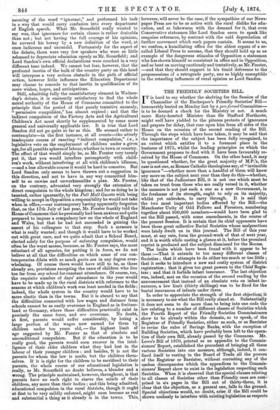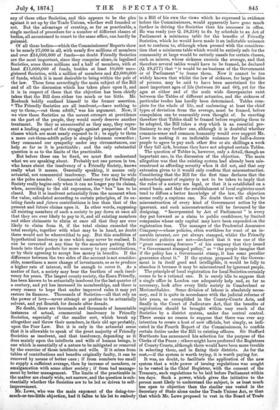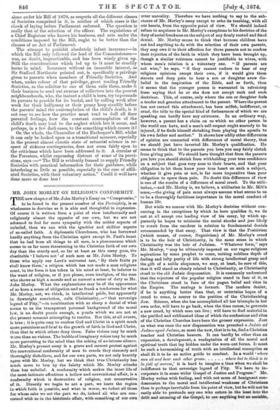THE FRMNDLY SOCIETIES BILL.
IT is hard to say whether the shelving for the Session of the Chancellor of the Exchequer's Friendly Societies' Bill— honourably buried on Monday last by a pro formel Committee— is to be deemed a check for the Ministry or not. A much more flinty-hearted Minister than Sir Stafford Northcote, might well have yielded to the piteous protests of ignorance and prayers for delay, that rose upon him from all sides of the House on the occasion of the second reading of the Bill.
Through the steps which have been taken, it may be said that the importance of the subject has been fully recognised, to an extent which entitles it to a foremost place in the business of 1875, whilst the leading principles on which the Government proposes to deal with it have been favourably re- ceived by the House of Commons. On the other hand, it may be questioned whether, for the great majority of M.P.'s, the case is not one, as Roman Catholic theologians say, of "invincible ignorance "—whether more than a handful of them will know any more on the subject next year than they do this—whether, like that of the Judicature Bill, it is not one which must be taken on trust from those who are really versed in it, whether the measure is not just such a one as a new Government, in the freshness of its strength, ought to rely on its majority, whilst yet unbroken, to carry through. It is said that the two most important bodies affected by the Bill—the Manchester Unity of Odd Fellows and Foresters, numbering together about 900,000 members—would have been glad to see the Bill passed, with some amendments, in the course of the present Session. It is certain that its chief opponents have been those great collective Burial Societies whose malpractices were lately dwelt on in this journal. The Bill of this year must, at any rate, form the ground-work of that of next year, and it is worth while casting a glance at it, before the promised reprint is produced and the subject dismissed for the Recess. The faults which have been found with it appear to be these :—That it extends to too many different classes of Societies ; that it attempts to do either too much or too little ; that it seeks to introduce a new and costly system of district registration ; that it gives too great powers to the Chief Regis- trar; and that it forbids infant insurance. The last objection was, indeed, met on the occasion of the second reading by the announcement that instead of an absolute veto on infant in- surance, a low limit (thirty shillings) was to be fixed for the burial insurances of infants under three.
In order to appreciate the strength of the first objection7 it is necessary to see what the Bill really aimed at. Substantially it does not seem to do more than to bring into one code the law relating to a number of different classes of Societies which the Fourth Report of the Friendly Societies Commissioners show to be already within the domain, so to speak, of the Registrar of Friendly Societies, either as- such, or as Barrister to revise the rules of Savings Banks, with the exception of Building Societies, which have probably been left to the opera- tion of their own Bill, already passed by the Commons. Mr. Lowe's Bill of 1870, printed as an appendix to the Commis- sioners' Report, established the precedent of bringing all these various Societies into one measure, although, indeed, it con- fined itself to vesting in the Board of Trade all the powers of the Registrar or Barrister, without correcting any of the useless discrepancies which the appendices to the Commis- sioners' Report show to exist in the legislation respecting such Societies. When it is observed that the special clauses relating to all classes of Societies other than Friendly ones are com- prised in six pages in the Bill out of thirty-three, it is clear that the objection, as a general one, falls to the ground. Special objections would, no doubt, arise if the Bill could be shown uselessly to interfere with existing legislation as respects any of these other Societies, and this appears to be the plea against it set up by the Trade -Unions, whether well founded or not. But the advantage of creating, as far as practicable, a single method of procedure for a number of different classes of bodies, all accustomed to resort to the same office, can hardly be gainsaid.
Of all these bodies—which the Commissioners' Reports show to be nearly 27,000 in all, with nearly five millions of members and over £34,000,000 of funds—no doubt Friendly Societies are the most important, since they comprise alone, in legalised Societies, some three millions and a half of members, with at least £11,000,000 of funds, besides at least 10,000 unre- gistered Societies, with a million of members and £2,000,000 of funds, which it is most desirable to bring within the pale of the law. These form accordingly the main subject of the Bill and of all the discussion which has taken place upon it, and it is in respect of these that the objection has been chiefly taken that the Bill does either too much or too little. Mr. Roebuck boldly confined himself to the former assertion. "The Friendly Societies are all insolvent,—have nothing to say to them,—cut them adrift," was his argument. Now, if we view these Societies as the merest attempts at providence on the part of the people, they would surely deserve another treatment. Be they as unsuccessful as they may, they repre- sent a leading aspect of the struggle against pauperism of the classes which are most nearly exposed to it ; to apply to them a mere cut-them-adrift policy is simply inhuman cowardice ; they command our sympathy under any circumstances, our help so far as it is practicable ; and the only substantial question is as to the limits of the practicable.
But before these can be fixed, we must first understand what we are speaking about. Probably not one person in ten, who hears about the insolvency of a Friendly Society, knows really what it means. Generally speaking, it means only actuarial, not commercial insolvency. The two may be wide as the poles asunder. Commercial insolvency for the Friendly Society really begins only when it can no longer pay its claims, when, according to the old expression, the "box" has to be closed. But it is insolvent actuarially from the moment when the value, calculated according to certain principles, of its ex- isting funds and future contributions is less than that of the present and future claims upon it. In other words, supposing all existing members of such a society to pay down at once all that they are ever likely to pay to it, and all existing members and other, claimants to claim at once all that they are ever likely to claim from it, if the total claims exceeded the total receipts, together with what may be in hand, no doubt there would not be wherewithal to pay. But this condition of hypothetical insolvency is one which may never be realised. It can be corrected at any time by the members putting their hands into their pockets for more money to pay contributions, or by their agreeing to accept less money in benefits. If the difference between the two sides of the account is not consider- able, sometimes a mere change of investments, so as to produce a higher rate of interest, will be enough to cover it. As a matter of fact, a society may bear the btuthen of such insol- vency for years. The largest county society, the Essex Friendly, has been known to be actuarially insolvent for the last quarter of a century, and yet has increased its memberships, and there is every reason to hope that under improved rules it may yet restore its finances. Thousands of Societies—all that rely on the power of levy—never attempt or profess to be actuarially solvent, and yet flourish for decade after decade.
No doubt, there are thousands and thousands of lamentable instances of actual, commercial insolvency in Friendly Societies, especially of the smaller sort, which break up altogether and throw their members, in their old age probably, upon the Poor Law. But it is only in the actuarial sense that it is allowable to speak of the great majority of Friendly Societies as insolvent, and that insolvency, depending as it does mainly upon the intellects and wills of human beings, is one which is essentially of a nature to be mitigated or removed by the exercise of those intellects and wills. If it arises from tables of contributions and benefits originally faulty, it can be removed by means of better ones ; if from numbers too small to supply a sufficient average, then by increase of members, or amalgamation with some other society ; if from bad manage- ment by better management. The limits of the practicable in the matter are clearly wide, not narrow' and the question is sub- stantially whether the Societies are to be led or driven to self- improvement.
Mr. Lowe, who was the main exponent of the doing-too- much-or-too-little objection, had it fallen to his lot to embody
in a Bill of his own the views which he expressed in evidence before the Commissioners, would apparently have gone much further in driving the Societies than his successor in office. He was ready (see Q. 28,258) to fix by schedule to an Act of Parliament a minimum table for the benefits of Friendly Societies, which he would have made it an indictable nuisance not to conform to, although when pressed with the considera- tion that a minimum table which would be entirely safe for the community at large would be entirely unsafe for certain classes, such as miners, whose sickness exceeds the average, and that therefore several tables would have to be framed, he declared (Q. 28,277) that "it would be no business of the Government or of Parliament" to frame them. Now it cannot be too widely known that whilst the law of sickness, for large bodies of persons, may be said to have been ascertained for the most important ages of life (between 30 and 60), yet for the ages at either end of the scale wide discrepancies exist between the Tables of different actuaries, and the sickness of particular trades has hardly been determined. Tables com- plete for the whole of life, and embracing at least the chief types of deviation from the average, must be framed, before compulsion can be reasonably even thought of. In enacting therefore that Tables shall be framed before requiring them to be adopted, the Bill takes a step which is an essential pre- limivary to any further one, although it is doubtful whether common-sense and common humanity would ever support Mr. Lowe in making it an indictable nuisance for half-a-dozen people to agree to pay each other five or six shillings a week if they fall sick, because they have not adopted certain Tables.
The question of Tables is, however, only a detail, though an important one, in the discussion of the objection. The main allegation was that the existing system had already been mis- construed as affording security when it did not, and that any extension given to it would only confirm that misconstruction. Considering that the Bill for the first time declares that the acknowledgment of registry is not to be taken to imply that the rules of a society are legal, or that it is established on a sound basis, and that the establishment of local registries must tend to diffuse a better knowledge of the law, the objection seems really a captious one. No doubt there will always 'be misconstruction of every kind of Government action by the ignorant, and such misconstruction will be favoured by the designing. "Incorporated by Act of Parliament" is every day put forward as a claim to public confidence, by limited companies whose only capital may have been expended on the registration fees. The manager of the Prudential Assurance Company—whose policies, often worthless for want of an in- surable interest, are yet always stamped, whilst the Friendly Societies' policies are not—declared that it was one of the "great canvassing features" of his company that they issued "a Government stamped policy," as "the people imagine that if the policy has a Government stamp, it has some peculiar guarantee about it." If the system proposed by the Govern- ment is in itself good and intelligible, it would be folly to abandon it because it may be misconstrued by ignorant people.
The principle of local registration for local Societies certainly seems to be a rational one. It is surely idle to suppose that a single office in London can adequately help and, so far as necessary, look after every little society in Cumberland or Merionethshire. Some division of labour is absolutely neces- sary, and it is quite in accordance with the judicial reforms of late years, as exemplified in the County-Courts Acts, and finally in the Court of Judicature Act, that the benefits of registration should be brought Within easy reach of the Societies by a district system, under due central control. There seems no reason to suppose that there was ever any intention to create a host of new officials, but simply, as indi- cated in the Fourth Report of the Commissioners, to confide certain duties under the Bill to existing officers. Sir Stafford Northcote has announced his selection for the purpose of the Clerks of the Peace; others might have preferred the Registrars of County Courts, although there would have been more trouble in selecting them, and in fixing their districts. As for the cost,—if the system is worth trying, it is worth paying for.
It was, no doubt, to facilitate the application of the new system that a wide power of issuing regulations was sought to be vested in the Chief Registrar, with the consent of the Treasury, such regulations to be laid before Parliament within ten days. Such a power, which gives the initiative to the person most likely to understand the subject, is as least much less open to objection than the similar one vested in the Secretary of State alone under the Trade Unions Act, or than that which Mr. Lowe proposed to vest in the Board of Trade alone ander his Bill of 1870, as respects all the different classes of Societies comprised in it, in neither of which cases is the check of laying before Parliament enforced. The question is really that of the selection of the officer. The regulations of a Chief Registrar who knows his business, and acts under the conditions imposed by the Bill, ought to be better than the clauses of an Act of Parliament.
The attempt to prohibit absolutely infant insurance—in which the Bill only followed the lead of the Commissioners— was, no doubt, impracticable, and has been wisely given up. Still the considerations which led up to it must be steadily borne in mind. Insurance without an insurable interest, as Sir Stafford Northcote pointed out, is specifically a privilege given to parents when members of Friendly Societies. And when, under colour of that privilege, great trading Friendly Societies, as the solicitor to one of them calls them, make it their business to send out swarms of collectors into the poorest neighbourhoods, who, the instant a child is born, try to persuade its parents to provide for its burial, and by calling week after week for their halfpenny or their penny keep steadily before the parents' mind the contemplation of the child's death, is it not easy to see how the practice must tend to dull all finer parental feelings, how the constant contemplation of the child's death may lead to the neglect which lets it occur, and perhaps, in a few dark cases, to the something which causes it?
On the whole, the Chancellor of the Exchequer's Bill, whilst it can only be looked upon as a transitional measure, especially in the present almost chaotic state of actuarial science in re- spect of sickness contingencies, does not seem fairly open to the criticisms which have been addressed to it. A circular of the Foresters, whilst expressing distrust of some of its provi- sions, says :—" The Bill is evidently framed to supply Friendly Societies with practical information for their guidance, while interfering as little as possible, especially in the case of affili- ated Societies, with their voluntary action." Could it well have done more or done less ?




































 Previous page
Previous page